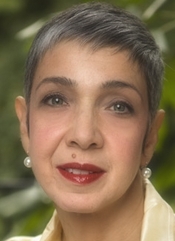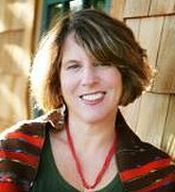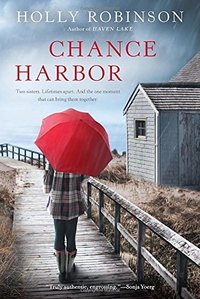In the coming months, I am going to be doing Q & A’s with a number of women’s fiction authors. I think you’ll find their work engaging and their thoughts—on writing, life and how to balance it all—fascinating. I know I did! First up is novelist, journalist and celebrity ghostwriter Holly Robinson. Holly is the author of several books, including The Gerbil farmer’s Daughter: A Memoir and the novels BEACH PLUM ISLAND and HAVEN LAKE. Her articles and essays appear frequently in The Huffington Post, More, Parents, Redbook and dozens of other newspapers and magazines. She and her husband have five children and a stubborn Pekingese. They divide their time between Massachusetts and Prince Edward Island, and are crazy enough to be fixing up old houses one shingle at a time in both places.
Holly’s newest novel, CHANCE HARBOR, tells the story of Catherine and Zoe. Though they are sisters, even their mother, Eve, admits her daughters are nothing alike. Catherine is calm and responsible. Zoe is passionate and rebellious. Nobody is surprised when Zoe gets pregnant, drops out of college, and spirals into drug addiction. One night Catherine gets a call from Zoe’s terrified daughter, Willow, saying her mother has abandoned her in a bus station and disappeared. Eve blames herself, while Catherine, unable to have children, is delighted to raise Willow as her own. Now, five years later, Eve is grieving her husband’s death and making reluctant plans to sell the family’s beloved summer home on Prince Edward Island. But a series of unexpected revelations will upend the family and rock three generations of women.
How do you go about constructing a novel?
A: I wish I knew! When I was first starting out, I used to think, “If I practice writing fiction long enough, I will learn how to write a novel.” Slowly I’ve realized that novels are like children: each one demands a different sort of upbringing, and the tricks that worked for the first book probably won’t work for the next. You just have to trust yourself enough to push through the mud and sleet and disasters along the way. Basically, that means getting enough words on the page so that you can fix everything that’s broken.
What was the inspiration for CHANCE HARBOR?
A: The novel starts with a child being left at a bus station by her mother, who says, “Call your aunt after I leave.” The mother then disappears. The genesis for that was the true story of one of my mother’s best friends, who was left at a city bus station by HER mother. I also wanted to set this novel on Prince Edward Island, because it has been my beloved second home for nearly 25 years.
New England seems very important to you; can you elaborate?
A: Because I grew up with a father who was in the Navy, my upbringing consisted of moving every few years whenever he got new orders. I think I was always looking for a place to belong. When I married my first husband, we were living in San Francisco, and we knew we’d never be able to afford a house there. My brother was in Massachusetts at the time; we moved into an apartment in his house, and when my brother took me on a day trip to the North Shore of Massachusetts, I felt, for the first time, like I was meant to live in this exact location. I love everything about it: the beaches, the small seaside towns, the do-it-yourself attitude of Yankees, and even the winters. I think I must have been a ship captain in a former life.
How do you use the settings in the novel to ramp up the emotion?
A: Like most writers, I’m often looking for a way to make scenes more emotional without using unnecessary adjectives or having my characters fall prostrate to the floor. In THE WISHING HILL, my first novel for Penguin, I used an old mill as a setting because it was where one of the characters worked and had a love affair, and because this mill (which I looked at from my own bedroom window as I worked on the book) oozed sorrow, with its water stains and rusty chains. For BEACH PLUM ISLAND, I used a barrier island—Plum Island, near my home in Massachusetts—because a barrier island is always changing due to storms, and the characters in that novel are facing enormous life upheavals because they’ve discovered a brother they never knew they had. CHANCE HARBOR, too, is an extremely emotional novel; for this one, I chose the very tip of Prince Edward Island. That easternmost point of the island really does feel like the end of the world, and these characters feel that they’ve reached a point in their lives where they might not be able to go on. Boy, that makes my books sound horribly dreary, doesn’t it? But I promise that good things happen, too!
Do you build your novels from your own family’s stories?
A: Absolutely! I’m extremely lucky to come from a family that loves to tell stories. I’ve been filing away these anecdotes since I was old enough to sit at a table with my parents and grandparents.
Are you drawn to writing about “broken” families and/or family secrets?
A: All families have secrets, and there are far more “broken” families than unbroken ones, so yes, I am. This is partly because, in my own family, my parents were divorced and my father married another woman. Then, after sixteen years, he went back to my mom and they were remarried. I, too, was divorced, and now I’m remarried and have a blended family of five children. The intricacies of families that break and reform are complex and endlessly intriguing to me. I like to say that I write “emotional family mysteries,” because I want to write books that read like your favorite mystery novels, but have at their core a family secret (or secrets) that will drive the narrative forward and reveal the characters as complex and relatable.
Some secrets are revealed in this novel; others are not. What’s your view on keeping secrets?
A: In my own life, or in my novels? Basically, my view is that everyone has secrets, and some really ought to be kept—especially if revealing them will do harm. On the other hand, the best fiction often involves secrets that are revealed unexpectedly and force the characters to go through a crisis and resolve their conflicts.
What’s obsessing you now?
A: I’m revising FOLLY COVE, a novel that will come out in Fall 2016, and it’s driving me bonkers. This book absolutely refuses to behave. So far, I’ve written it from three points of view, then decided a fourth had to be added, and when I did that, I discovered that one of the other main characters served no real purpose. Now I’m in the process of killing that character off early in the book—which of course causes all sorts of ramifications for the rest of the family—and revising the novel accordingly. At the same time that I’m doing all this, I’m researching my next novel —always the fun part, before I start digging in and realizing once again that writing is so HARD that sometimes I want to lie down and put a cold cloth over my eyes until my impulse to write fiction goes away.
About CHANCE HARBOR
Catherine and Zoe are sisters, but even their mother, Eve, admits her daughters are nothing alike. Catherine is calm and responsible. Zoe is passionate and rebellious. Nobody is surprised when Zoe gets pregnant, drops out of college, and spirals into drug addiction.
One night Catherine gets a call from Zoe’s terrified daughter, Willow, saying her mother has abandoned her in a bus station and disappeared. Eve blames herself, while Catherine, unable to have children, is delighted to raise Willow as her own.
Now, five years later, Eve is grieving her husband’s death and making reluctant plans to sell the family’s beloved summer home on Prince Edward Island. But a series of unexpected revelations will upend the family and rock three generations of women.
Buy CHANCE HARBOR: Amazon.com | Kindle | BN.com | iTunes/iBooks | Kobo | Google Play | Powell’s Books | Books-A-Million | Indiebound | Amazon CA | Amazon UK | Amazon DE | Amazon FR
About Yona Zeldis McDonough
 Yona Zeldis McDonough is the author of six novels; her seventh, THE HOUSE ON PRIMROSE POND, will be out from New American Library in February, 2016. In addition, she is the editor of the essay collections The Barbie Chronicles: A Living Doll Turns Forty and All the Available Light: A Marilyn Monroe Reader. Her short fiction, articles and essays have been published in anthologies as well as in numerous national magazines and newspapers. She is also the award-winning author of twenty-six books for children, including the highly acclaimed chapter books, The Doll Shop Downstairs and The Cats in the Doll Shop. Yona lives in Brooklyn, New York with her husband, two children and two noisy Pomeranians.
Yona Zeldis McDonough is the author of six novels; her seventh, THE HOUSE ON PRIMROSE POND, will be out from New American Library in February, 2016. In addition, she is the editor of the essay collections The Barbie Chronicles: A Living Doll Turns Forty and All the Available Light: A Marilyn Monroe Reader. Her short fiction, articles and essays have been published in anthologies as well as in numerous national magazines and newspapers. She is also the award-winning author of twenty-six books for children, including the highly acclaimed chapter books, The Doll Shop Downstairs and The Cats in the Doll Shop. Yona lives in Brooklyn, New York with her husband, two children and two noisy Pomeranians.




No Comments
Comments are closed.